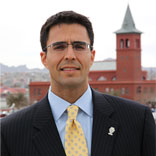- Home
- About CATS
- The Transect
- Transect Codes Council
- Resources & Links
- Contact CATS
- CATS Programs
- Research
- Publications
- Education
- AWARDS
- CATS TOOLS
- Codes
- Modules
- Images
Andy Blake
2016 Groves Award Winner

Andy Blake, City Manager for the City of Ranson, West Virginia, received the 2016 Groves Award, given annually by the Congress for the New Urbanism and the Transect Codes Council to recognize outstanding leadership and vision in the promotion of Transect-based planning.
The jury selected Blake for his leadership in shepherding a series of Partnership for Sustainable Communities grants from the U.S. Department of Housing and Urban Development (HUD), the Environmental Protection Agency (EPA), and the U.S. Department of Transportation (DOT). Those efforts resulted in:
Blake received the Groves Award June 9, 2016, at the 24th Congress for the New Urbanism in Detroit, Michigan.
Matthew Lewis
2015 Groves Award Winner

Matthew Lewis, the Assistant Director of Planning & Development for the City of Austin, Texas, received the 2015 Groves Award, given annually by the Congress for the New Urbanism and the Transect Codes Council to recognize outstanding leadership and vision in the promotion of Transect-based planning.
Lewis recently served as the Development Services Director for the City of San Marcos, Texas, and prior to that assignment served as the Community Development Director for the City of Hutto, Texas. In both San Marcos and Hutto, he used his passion, persistence and know-how to lead the successful adoption and implementation of Transect-based comprehensive plans and codes.
In his current role for the City of Austin, Texas, he continues to apply his expertise and high-energy approach to improving the quality of development through Transect-based planning, coding and implementation.
Rick Bernhardt
2014 Groves Award Winner

Rick Bernhardt, Executive Director of the Metro Nashville Planning Department, received the 2014 Groves Award, given annually by the Congress for the New Urbanism and the Transect Codes Council to recognize outstanding leadership and vision in the promotion of Transect-based planning.
Bernhardt has incorporated the use of the Transect into community-wide planning in Metro Nashville as a tool to ensure the ordering and organization of the built and un-built environment based on its rural-to-urban context. This allows important features such as building type and public right-of-way design to correspond to its appropriate setting in terms of development intensity.
The jury selected Rick as the 2014 Groves Award recipient because of his long-term leadership in furthering Transect-based planning and coding. His accomplishments include:
Treasure Coast Regional Planning Council
2013 Groves Award Winner

TCRPC is the Treasure Coast's only regional forum where elected and appointed leaders regularly come together to discuss complex regional issues, develop strategic regional responses for resolving them, and build consensus for setting and accomplishing regional goals. The TCRPC has use the Transect as a pivotal tool in placemaking regionally and throughout Florida. The jury selected the Treasure Coast Regional Planning Council as the 2013 Groves Award because of the group's long-term leadership in furthering regional knowledge of Transect-based planning and coding. Included in TCRPC's Transect-based accomplishments is the St. Lucie Towns, Villages, and Countryside Plan and Transect-based code adopted in 2006, which covers 155,000 people over 49,087 acres, enabling both livability and preservation.
Since 1989, the Council has been providing town planning and urban design assistance upon request to local governments in the Treasure Coast Region and, more recently, in other areas of the state. The TCRPC Urban Design Studio is a team of urban designers, architects, and graphic technicians. A total of 58 public charrettes have been conducted in which Council has either has an important role or been the prime facilitator and organizer. Council has assisted in other 23 charrettes. Master Plans have been prepared, design guidelines, comprehensive plan amendments, traffic calming measures and codes have been recommended, and assistance with implementation has been provided.
The Awards Jury consisted of Jason King, Dover, Kohl & Partners; Rick Hall, Hall Planning and Engineering, Eliza Harris, Canin & Associates, Matthew McElroy, City of El Paso and winner of the 2012 Groves Award, Bill Spikowski, Spikowski Planning Associates, Matt Lambert, Duany Plater-Zyberk & Co., and Hazel Borys, PlaceMakers.
Mathew McElroy
2012 Groves Award Winner

Mathew McElroy, Deputy Director of Planning and Economic Development in the City of El Paso, has been chosen to receive the 2012 Groves Award recognizing outstanding leadership and vision in the promotion of Transect-based planning. The jury unanimously selected Mathew based on his leadership in adopting New Urban and Transect-based plans, including a new city-wide comprehensive plan, leadership in multiple SmartCode rezonings throughout the City of El Paso, his commitment to CNU accreditation, and his reform of the city’s conventional subdivision regulations.
The Center for Applied Transect Studies created the Groves Award to recognize such leaders. The award is named in honor of Ken Groves, the late planning director of the City of Montgomery, Alabama, who led the adoption and use of Transect-based land development to create better communities. As a result of his leadership, Alabama’s capital city began its journey back to prominence and sustainability.
The Groves Award is given jointly by the Transect Codes Council and the Congress for the New Urbanism. McElroy received the award May 11, 2012, at the 20th Congress for the New Urbanism in West Palm Beach, Florida.
Ana Gelabert-Sanchez and Manny Diaz
2011 Groves Award Winners


Ana Gelabert-Sanchez and Manny Diaz are the inaugural recipients of the Groves Award to recognize outstanding leadership and vision in the promotion of transect-based planning. Gelabert-Sanchez, as the former planning director of the City of Miami, and Diaz, as the former mayor, are credited with shepherding the landmark Miami 21 zoning code from conception to implementation.
Miami was the first major U.S. city to adopt transect-based zoning citywide. The Transect functions as a framework to ensure that development occurs in context with the character of each place. Transect-based planning reverses the damaging, auto-centric development patterns that have characterized growth over the last 60 years. Based on the model SmartCode, Miami 21 replaced the city’s outdated zoning with a code that formally incorporates walkability, sustainability, predictability, respect of neighborhood context, and a high-quality public realm.
From its launch in April 2005, Diaz provided the broad, positive vision of the city Miami could become in the 21st Century. He continued to make the case throughout his tenure, and even after leaving office. Diaz led the political charge with a hands-on approach and spearheaded the effort to incorporate environmental stewardship into the code. Gelabert-Sanchez oversaw the massive, five-year effort to write, edit, test, and implement the code. The project included a major marketing and outreach campaign, more than 500 meetings with community stakeholders, and the work of a large consultant team.
The Center for Applied Transect Studies created the Groves Award to recognize such leaders. The award is named in honor of Ken Groves, the late planning director of the City of Montgomery, Alabama, where he led the adoption and use of transect-based land development to create better communities. As a result of his leadership, Alabama’s capital city began its journey back to prominence and sustainability.
The Groves Award is given jointly by the Transect Codes Council and the Congress for the New Urbanism. It was presented to Ana Gelabert-Sanchez and Manny Diaz on Saturday, June 4, 2011, at CNU 19 in Madison, Wisconsin.
“Thanks to the tireless efforts of Ana and Mayor Diaz, Miami 21 represents a model for coding reform for large, complex urban environments,” said Victor Dover, chair of both the Groves Award jury and the CNU Board. “It’s a landmark achievement. Their combined leadership, determination, persistence, and political know how were key elements for its approval.”
